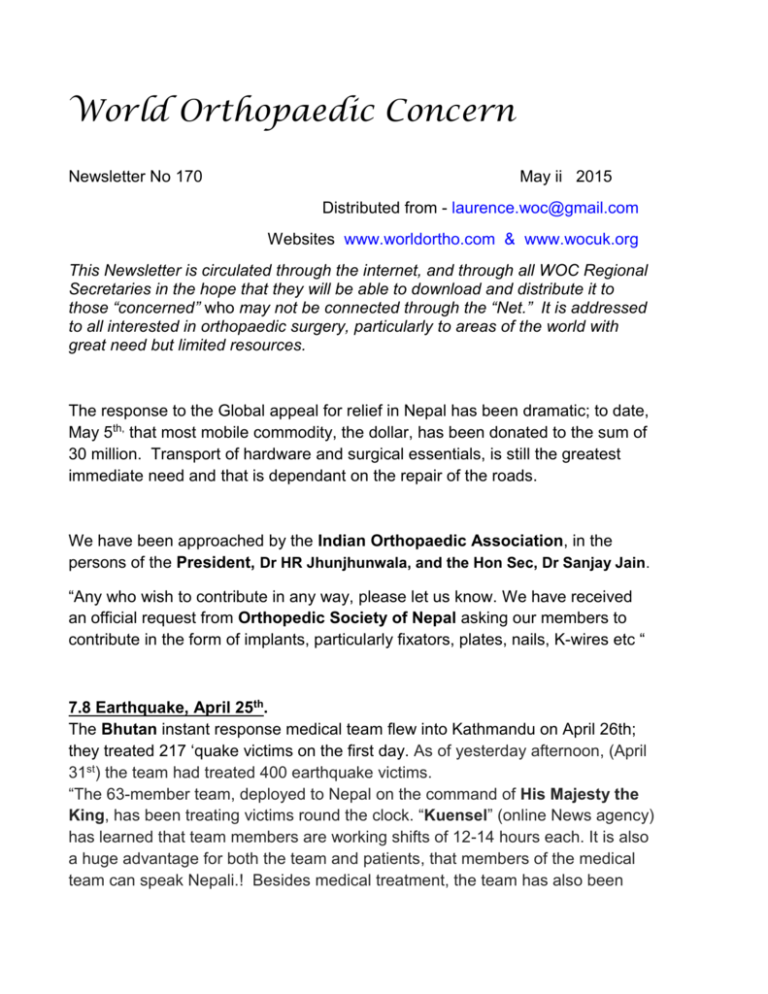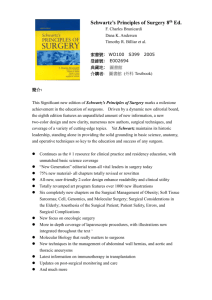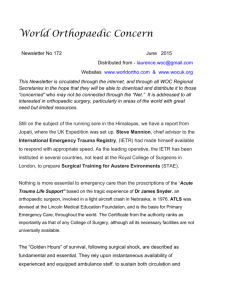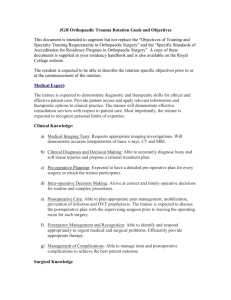woc newsletter 170 2015
advertisement

World Orthopaedic Concern Newsletter No 170 May ii 2015 Distributed from - laurence.woc@gmail.com Websites www.worldortho.com & www.wocuk.org This Newsletter is circulated through the internet, and through all WOC Regional Secretaries in the hope that they will be able to download and distribute it to those “concerned” who may not be connected through the “Net.” It is addressed to all interested in orthopaedic surgery, particularly to areas of the world with great need but limited resources. The response to the Global appeal for relief in Nepal has been dramatic; to date, May 5th, that most mobile commodity, the dollar, has been donated to the sum of 30 million. Transport of hardware and surgical essentials, is still the greatest immediate need and that is dependant on the repair of the roads. We have been approached by the Indian Orthopaedic Association, in the persons of the President, Dr HR Jhunjhunwala, and the Hon Sec, Dr Sanjay Jain. “Any who wish to contribute in any way, please let us know. We have received an official request from Orthopedic Society of Nepal asking our members to contribute in the form of implants, particularly fixators, plates, nails, K-wires etc “ 7.8 Earthquake, April 25th. The Bhutan instant response medical team flew into Kathmandu on April 26th; they treated 217 ‘quake victims on the first day. As of yesterday afternoon, (April 31st) the team had treated 400 earthquake victims. “The 63-member team, deployed to Nepal on the command of His Majesty the King, has been treating victims round the clock. “Kuensel” (online News agency) has learned that team members are working shifts of 12-14 hours each. It is also a huge advantage for both the team and patients, that members of the medical team can speak Nepali.! Besides medical treatment, the team has also been distributing tents, blankets, t-shirts, and jackets to patients.” This message was sent on the fifth day when the team has been treating victims in Trishuli, Nuwakot district, located 34km from the epicentre. Trishuli is one of the three worst hit areas in Nepal. It was at least a two-and-a-half hour drive from Kathmandu, when the roads were intact; but they did survive the worst damage. Kuensel reports “that the mood in the camp is good and enthusiasm high. Their spirits were lifted as a result of two particular cases on April 30. A healthy baby girl was delivered by Caesarean section, after her mother was brought to the camp following complications. Both mother and daughter are safe. The medical team also operated on a two-year old girl, who is now in a stable condition. She was found in the forest beside the body of her mother, who had been killed by a falling boulder. (“Kuensel OnLine” news site, Bhutan). “Most patients being treated at the Bhutan camp have required orthopaedic treatment, mainly fractures, many “open”. The team has set up two wards and is hosting 30 patients. In another development, a team from Nepal, including an Army Battalion commander, visited the Bhutan camp to arrange for the deployment of Bhutanese teams further out in remote areas. The relief team scouted for a location and will deploy a unit tomorrow. The Nepal team has distributed food supplies and water purification tablets. Two more relief camps have now been established in the vicinity, easing pressure on the Bhutan camp. “The team has been working with the spirit characteristic of the Bhutanese people, forging an important connection with those of our neighbouring country. The team has made use of its extensive experience, operating the Kidu Mobile Medical Unit, to set up and operate camps in any remote location. They have enriched their own knowledge and experience. Many visitors to the camp have observed and admired their work, and promptly joined them. “Water donations have been pouring in at the temporary warehouse on the ground floor of the Office of the Attorney General in lower Changangkha. 20,000 litres have been distributed and 12,000 more are expected today. Donations to the “Bhutan4Nepal” private initiative by Dawa Penjor, the executive director for the Bhutan Media Foundation, have reached Nu 600,000. The Institute of Language and Cultural Studies has raised Nu 165,000. Bhutan donated Nu 63M (million = or USD 1M) to Nepal for rehabilitation efforts, two days after the ‘quake. The death toll in Nepal has passed 8000, as of yesterday. More than 19,000 have been severely injured. ( Gyalsten K Dorji } This edited report was brought to us by Kate Finsham, from our partner society, Health Volunteers Overseas (HVOUSA). It emphasizes the value of military speed, of proximity, and the flexibility of money, as soon as the “dust has settled.” Many have written expressing willingness to offer their own hands to the tasks which will clearly require many months of dedicated surgical work. James Metcalfe (Plymouth) has been a Teaching visitor to Kathmandu in calmer times. He writes about the difficulty of communicating with his friends in the Kathmandu University hospitals, who – understandably – are “otherwise engaged” just now. He is a willing visitor and has collected the sort of Emergency hardware required; but he has a logistic problem about transportation. He is very conscious of the impossibility of a single person working without a team. In the meantime he writes, “I have decided to join “UK Med” and have applied for the course in “Surgery in Austere Environments.” To be prepared in advance must be essential and an efficient way of delivering timely orthopaedic care in any future disaster. -o0o- The Lancet Commission Global Surgery launched its long awaited report at the Royal Society of Medicine’s London HQ, on April 27th and 28th, at I, Wimpole Street. The “Lancet” is to be congratulated and thanked for bringing together every aspect of the world’s health inequalities in the provision of demonstrable surgical need. The object of the 25 man commission was to address the following questions:"What is global surgery and how will it be shaped beyond 2015? What is the role of the UK and other high income countries in delivering safe, affordable, and equitable surgical care to all those who need it. How can we prepare the next generations of surgical teams to engage in global health at the earliest point, in their education and career, through multidisciplinary teams of surgeons, obstetricians, anaesthetists, nurses, emergency medicine clinicians, as well as perioperative, palliative and rehabilitation care teams?“ The subtitle of the conference, GS 2030, was set as a target for change, realistically based on the time required to train the required surgical manpower. It is hoped that that date is not so distant as to move the project to simmer on the “back burner”. From the practical point of view, “bell-weather procedures” have been defined as essential for a surgical service, based on the frequency of presentation, and the need for rapid surgical intervention:- namely the are -- 1. Ceasarian section, 2. abdominal laparotomy and 3. compound long-bone fracture. Round this group of emergencies, is to be built Essential Surgical Practice. They constitute the foundation of “General Surgery” – a subject which as defined, is not part of modern surgical training in western “Centres of Excellence,” where Specialists are trained in narrow fields of practice. All aspects of simple, safe, and affordable surgery, are definitions which beg conditions. -Two days were set aside to present the work of an International body of surgeons, statisticians, administrators and economists. Every aspect of surgery and its close partner anaesthesiology, were covered in a concentrated programme of papers, discussions, films, graphs and pie-charts. A notable feature of the audience was its youth. It has become clear that the situation, vis-à-vis medical education, now figures in Medical School curricula. Very soon after the first announcement of the meeting, it was oversubscribed, so popular had the first three such annual gatherings been, at the Royal College of Surgeons. Perhaps it is obvious that surgical need has been driven by Obstetrics, in the far flung rural corners of the LMICs; nothing is more pressing than the inevitability of obstructed labour. Every operative facility has to face that pressing emergency. One of the most notable contributions came from Professor Lesley Regan from Imperial College, who stimulated the audience with the reassurance that Caesarian section was not technically a difficult operation, and that its need was fundamental to the concept of “Surgery in General”. The program necessarily presented an abundance of statistical analyses and comparison, beginning with definitions. The President of the RSM, Mr Babilal Sethia, introduced the subject, followed by Mr Andy Leather, the Director of the Global Health Centre at King’s College. London. Several of the presentations had input from the other Commission chairmen, Drs John Meara and Lars Hagander. The penultimate session was packed tightly with the specific problems of the musculo-skeletal system, chaired by Professor Chris Lavy. The evident popularity of the subject does reflect the very wide appreciation of the world’s growing concern.The involvement of influential bodies – both governmental and non-ditto``-- and the presence at the meeting of their representatives, is clear evidence that modern medicine and surgery are experiencing economic anxiety in regard to national and international responsibility. The audience, which packed the main auditorium of the RSM, was an interested, and interesting, mixture of middle aged and mature but active surgeons. The preponderance were youthful practical trainees with a keen interest in both the individual patient and the anonymous masses (5 billions of whom will never see a surgeon). “it will require mobilization of domestic and international funding sources, as well as a commitment to surgical care as a component of national health services. Funding generation will be aided by increased transparency and accountability to monitor financial flows and innovative methods to reduce costs for both patients and health systems.” (from the Commission statement). The conference was drawn to a close with a summary and clearly intentional statement assuring the audience (and listeners far away) of the profession’s personal involvement. The final pages, of the Lancet’s website, readers are urged to peruse is a flood of “blogged”, reasoned comment in earnest support of the whole concept. The summary of the days’ proceedings was eloquently given by the President of the Royal College of Surgeons (of England) Ms Clare Marx, who assured the audience of the support form the Royal Colleges. It is recommended that anyone interested in overseas work should visit this webpage and read the summary articles. The ambition of the working group is impressive, and the aims commendable. Only if we promote the message, and support those behind this initiative, will the positive words turn into actions over the coming years. Much of the material is certainly useful for anyone making a bid for funding, or seeking other forms of assistance, to establishing projects. (The comments from the above report are an amalgam from members of the audience, including Laurence Wicks and Geoffrey Walker.) -o0oIn response to the previous Newsletters on the subject of the particular requirements of the provincial hospitals in Zimbabwe, we hear from Dr Nicodimus Kadumbo, from Bulawayo. “Currently we are developing a Trauma data base at Mpilo Hospital, Bulawayo, for general surgical cases. I will post the audit results to you at the end of this year. I will be moving to Gweru Provincial hospital soon, where your support will be greatly appreciated.” Erratum. In the last Newsletter (169), the Second annual meeting of WOC (UK). is to be held at the Botnar Research Centre at the Nuffield Orthopaedic Centre, Oxford, on Saturday 6th June. 2015. It was erroneously stated that the organsing secretary was Mr Laurence Wicks, (Leicester Royal Infirmary). The Society Secretary, Ms Deepa Bose, corrects us, that she organized the meeting; but as she will not be attending the meeting, she has asked that late bookings should be made through Mr Wicks. We offer apologies. [M. Laurence]





